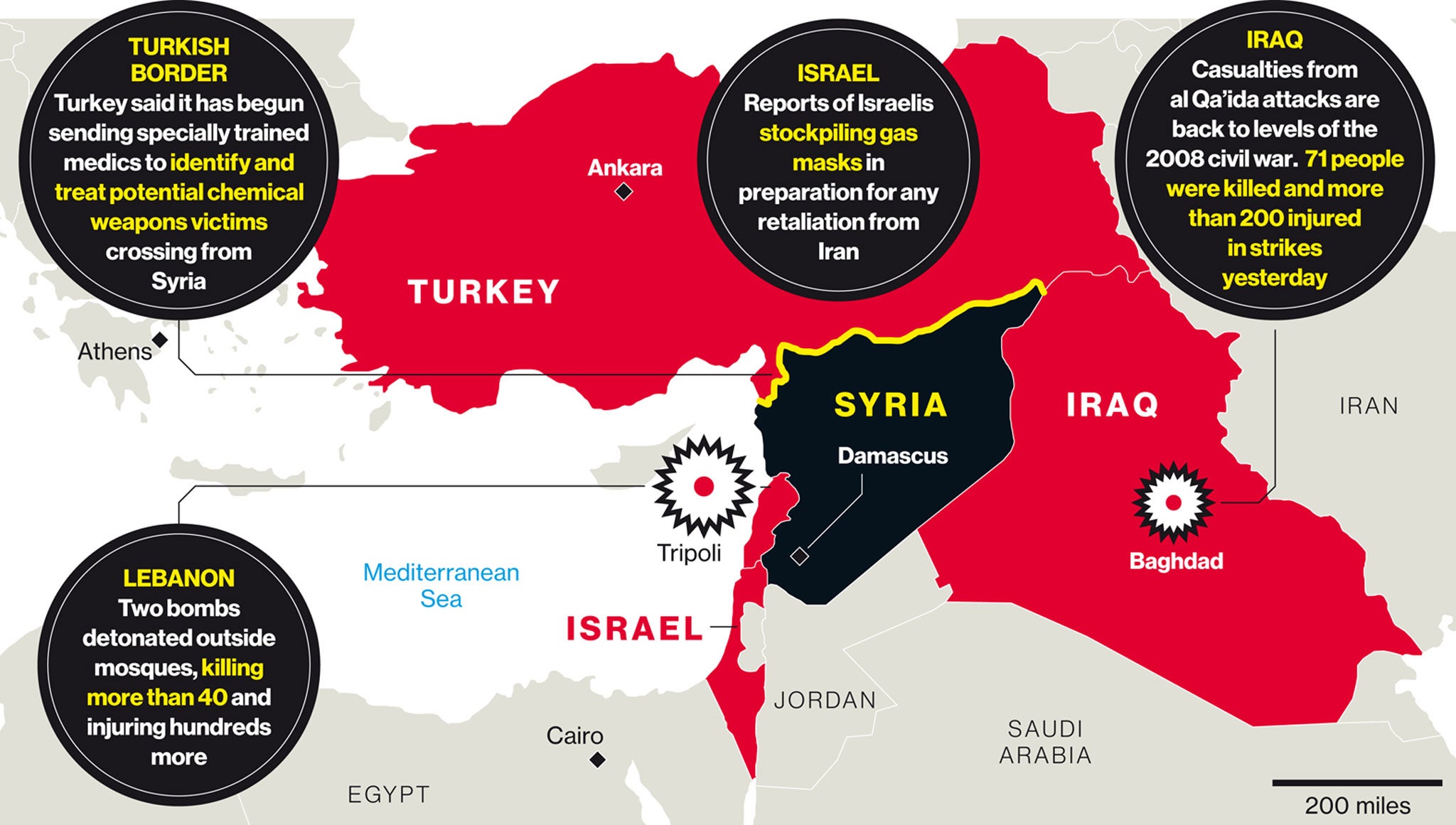How Syria action risks unsettling fragile Middle East balance of power
The violence has already affected neighbouring states and strengthened the hand of jihadists


Whatever else missile strikes on Syria do they will raise the political temperature in the whole region. What is unclear is whether or not the increased temperature will be temporary or permanent. Whatever the justification for the action by the US and its allies, it will be seen across the world as another American-led military intervention in the wider Middle East in the tradition of Iraq, Afghanistan, Somalia, Libya and Lebanon over the last 35 years.
British and French military actions are being justified by David Cameron and François Hollande on purely moral grounds as an act of retribution for the use of poison gas against civilians in Damascus and to prevent it happening again. This may go down well with domestic audiences but it will find few believers in the Middle East. The former US National Security Adviser Zbigniew Brzezinski was reported as saying in an interview: “I am struck by how eager Great Britain and France appear to be in favour of military action. And I am also mindful of the fact that both of these two powers are former imperialist, colonialist powers in the region.” The air strikes will only confirm suspicions of British and French motives.
Will air strikes help spread the Syrian conflict to other countries in the region? The important point here is to take on board how far it has already spread and the degree to which it already destabilising Syria’s neighbours. The al-Qa’ida-linked Islamic State of Iraq and Levant, which fights in both Iraq and Syria, has already become stronger thanks to Syria, and is responsible for bombings in Iraq more intense than anything seen since 2008. The same organisation is responsible for ethnically cleansing Syrian Kurds in north-east Syria, 40,000 of whom have already fled to the autonomous Kurdistan Regional Government in northern Iraq. If the Assad government becomes weaker then the Islamic State, al-Nusra Front and other jihadists, the most effective rebel fighting forces, will be strengthened.
Turkey is likely to support US actions, its importance depending on whether or not the US air base at Incirlik in south-east Turkey is used. Turkey has a 560-mile long frontier with Syria but it is vulnerable to Syria and Iran acting through Turkey’s Kurdish minority. Turkish government support for the rebels in Syria is also strongly opposed by the Turkish opposition who have been reinvigorated by mass street protests this summer.

Lebanon is already shuddering under the impact of the Syrian crisis with big bombs against a Shia district in south Beirut and two Sunni mosques in Tripoli. As many as a million Syrians have fled to Syria. Lebanon is not breaking apart yet but the air strikes will raise tensions further. But, despite occasional threats, it is scarcely in the interests of Iran or Hezbollah to stoke the Syrian conflict, which endangers both of them, by action against Israel or Western interests.
Jordan is as usual trying to balance contending forces, with a spokesman saying: “Jordan will not be a launching pad for any action against Syria.” But there are well-sourced reports that Jordan is indeed a base for CIA training of Syrian rebels with support from Saudi Arabia.
Israel is in an ambivalent position: on the one hand it would be glad to get rid of President Assad and see the destruction of Syria which has been at heart of state opposition to Israel for 40 years. On the other hand, the forces most likely to replace Assad could be more anarchic and more dangerous. What also if the civil war ended with a weakened Assad still in power but even more dependent on Iran and Hezbollah?
President Obama faces a problem in his effort to decide on military action vigorous enough to show US military strength but not so strong that it radically changes the balance of power on the ground in Syria. He wants a broad-ranging coalition but some members of this such as Saudi Arabia, Qatar and Turkey want to go much further than him in a campaign to overthrow the government in Damascus.
And whatever happens the balance of forces will be disturbed, affecting not only the struggle within Syria but regional confrontation between Sunni and Shia and between Saudi Arabia and Iran.
Join our commenting forum
Join thought-provoking conversations, follow other Independent readers and see their replies
0Comments